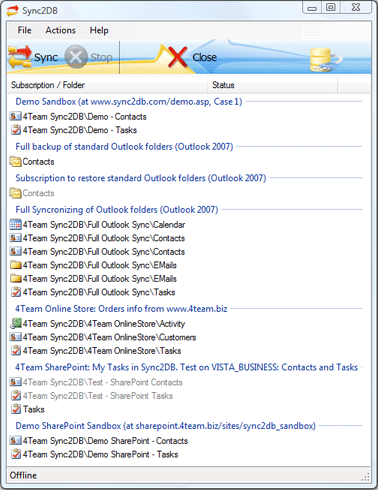Customer Spotlight – Sync2DB (Outlook to Database Synchronization)
If you were to ask me what the three most commonly requested synchronization targets are, I think I would have to say Outlook to Database, Database to Database and SharePoint. Today I would like to highlight one of our partners who have worked to solve some of this. Sync2DB is a simple to use Windows application that enables synchronization between Microsoft Outlook and your database. Best of all, it is all based on the Microsoft Sync Framework! When talking to Sergej Klimuk, of Sync2DB, he explained to me that “All other synchronization solutions between Microsoft Outlook and databases are complicated because they require configuration and an Outlook add-on installation on each user account and PC and allow only one connection at a time. Sync2DB is the first tool that helps to avoid or minimize the user interaction with the program, and helps developers create safe data subscriptions, providing synchronization and deploy the application onto thousands of users' PCs in a matter of days”. One example of a typical use case involves an employee who logs in to the corporate website and clicks the “subscribe/ synchronize/ upload Outlook data” button. The Application will automatically get downloaded and installed on the user’s PC. The data and fields selected by the administrator in a Microsoft Outlook folder will be automatically uploaded to the selected database with pre-defined parameters. The process of synchronization can be fully silent without any user interactions, or fully displayed with all the required program interfaces and notifications, along with the status of upload/synchronization. Synchronization processes that will follow can be fully automated /scheduled or requested manually from corporate website after logging in, as well as from the desktop shortcut that will require logon. In the current implementation, Sync2DB has made it possible to synchronize any Microsoft SQL database with Microsoft Outlook (versions 2002-2007). In addition they are targeting support of Microsoft SharePoint Server Data as well as other database systems such as MySQL which will help customers solve a number or other common requests. For more details, please visit https://www.sync2db.com Liam Cavanagh |
 |
Comments
Anonymous
February 06, 2009
PingBack from http://blog.a-foton.ru/index.php/2009/02/06/customer-spotlight-%e2%80%93-sync2db-outlook-to-database-synchronization/Anonymous
February 25, 2009
We recently updated our official MSF blog with three new Customer Spotlight case study data detailing